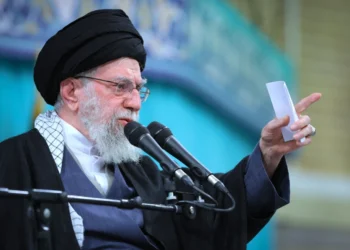JERUSALEM/TEHRAN/WASHINGTON (Realist English). After nearly two weeks of escalating hostilities, what President Donald Trump called the “12-Day War” between Israel and Iran has entered a precarious ceasefire — one brokered in haste, maintained with difficulty, and claimed as a success by all sides.
Overnight, the region shifted from open warfare to fragile calm. But far from resolving the crisis, the ceasefire has deepened questions: Who truly gained the upper hand? Can this pause lead to diplomacy? And is the Middle East any closer to lasting stability?
A war by any other name
The conflict reached a tipping point Saturday night when U.S. forces, at Israel’s request, launched coordinated strikes on Iran’s nuclear sites at Fordow, Natanz, and Isfahan. Trump declared the facilities “completely obliterated.”
In response, Iran fired ballistic missiles at the U.S. Al Udeid airbase in Qatar — marking a rare direct attack on American forces in the Gulf. With both sides appearing ready for escalation, Trump unexpectedly declared on Truth Social that a “Complete and Total Ceasefire” had been agreed.
The truce faltered within hours. Israel launched a retaliatory strike on a radar site near Tehran, claiming Iran had fired two missiles into its airspace — both of which were intercepted. Tehran denied the launches. Trump, visibly frustrated, told reporters: “These two countries have fought for so long, they don’t know what the hell they’re doing.”
After a tense morning, Trump confirmed the ceasefire was back on. “ISRAEL is not going to attack Iran. All planes will turn around and head home… Nobody will be hurt,” he posted online.
What did Israel accomplish?
June 13 marked a turning point: for the first time, Israel directly targeted Iranian nuclear infrastructure, striking beyond Syria and Iraq — a bold move designed to demonstrate range and resolve.
Prime Minister Benjamin Netanyahu claimed the strikes had neutralized an “existential threat” and praised Israel’s ability to pull the United States into direct military action. He later thanked Trump for standing “shoulder to shoulder” with Israel.
Yet Israel faces legal and diplomatic headwinds. The strikes, described by Jerusalem as anticipatory self-defense, were met with international skepticism. No independent verification yet confirms that Iran was on the brink of a nuclear breakout.
Still, Israel’s message is clear: it can strike deep inside Iranian territory, and it can do so with U.S. support — if only under exceptional circumstances.
Did Iran defend its program?
Damage to Iran’s facilities is evident — satellite images show hits on surface structures — but underground damage remains unverified. The IAEA’s Rafael Grossi warned that given the sensitivity of centrifuges, significant internal destruction is likely.
At the same time, Iran appears to have anticipated the assault. Atomic Energy Organization head Mohammad Eslami insisted that recovery plans were already in place and that production would not be interrupted.
However, key questions linger: Where is Iran’s stockpile of enriched uranium? And who fired the missiles that disrupted the ceasefire?
Tehran has denied involvement, raising fears of uncontrolled escalation — or errors, like the 2021 downing of a Ukrainian passenger jet by Iranian forces.
Is this the end — or just a pause?
Despite the ceasefire, neither Israel nor Iran has shifted its long-term position.
Iran’s parliament is already considering legislation to suspend cooperation with the IAEA, while President Trump has reiterated that he will not allow Iran’s nuclear programme to resume.
International diplomacy has begun to stir. On June 20, Iranian Foreign Minister Abbas Araghchi met with officials from France, Germany, the UK, and the EU’s foreign policy chief in a failed attempt to prevent U.S. strikes. Still, Europe may be Iran’s last diplomatic lifeline.
“Iran will try to involve the Europeans diplomatically by proposing enhanced monitoring,” said Ioannis Kotoulas, a lecturer in geopolitics at the University of Athens. “The U.S. could accept a peaceful program. Europe is now Iran’s only way out.”
But with trust shattered, and calls for full uranium enrichment suspension emerging only from within Iran’s civil society — not its leadership — compromise remains elusive.
The 12-Day War may have ended with a handshake in silence, but the fundamentals remain unchanged: Israel still sees Iran as a looming nuclear threat, while Tehran views U.S. and Israeli actions as existential aggression. Both sides claim strategic victory, yet neither has secured long-term advantage. Without a credible diplomatic channel — and with mutual distrust deepened — this ceasefire is not peace, but a pause between storms.


















